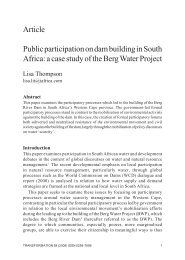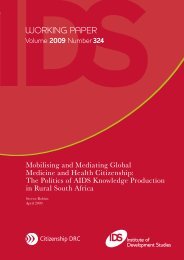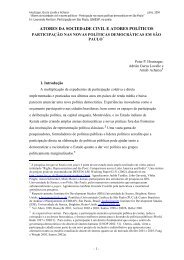Associations and the Exercise of Democratic ... - Citizenship DRC
Associations and the Exercise of Democratic ... - Citizenship DRC
Associations and the Exercise of Democratic ... - Citizenship DRC
Create successful ePaper yourself
Turn your PDF publications into a flip-book with our unique Google optimized e-Paper software.
IDS WORKING PAPER 285There has been, secondly, an accompanying expansion in civil <strong>and</strong> participatoryrights that sanctions new forms <strong>of</strong> societal accountability <strong>of</strong> public bureaucracy. 16These include prominently <strong>the</strong> right <strong>of</strong> review <strong>of</strong> administrative decisions <strong>and</strong>services, 17 <strong>the</strong> right to information, <strong>and</strong> participatory rights <strong>of</strong> citizens <strong>and</strong>organisations representing groups affected by public policy. These novel forms <strong>of</strong>vertical accountability are not only, or even primarily, to control <strong>the</strong> lawfulness <strong>of</strong>government’s actions in regards to civil liberties, but particularly <strong>the</strong> lawfulness <strong>of</strong>‘unequal action’ or inaction in meeting its duty to fulfill <strong>the</strong> array <strong>of</strong> social rights<strong>and</strong> lesser legal entitlements. 18 Legislatures across regions <strong>of</strong> <strong>the</strong> world havedelegated authority to new institutional sites, situated alongside legislative bodies<strong>and</strong> <strong>the</strong> courts, for citizen exercise <strong>of</strong> societal accountability. These sites can belocated directly within government agencies, as in <strong>the</strong> case <strong>of</strong> Brazil’s ouvidorias(agency or administrative unit-level ombudsmen) or administrative tribunals, or inhybrid bodies composed by both government <strong>and</strong> collective actors representingsegments <strong>of</strong> <strong>the</strong> population, such as tripartite deliberative councils. 19There is no doubt that judicial review remains critical for challenging <strong>the</strong> lawfulness<strong>of</strong> a government action but for many types <strong>of</strong> remedies it is only legally availableafter exhausting all review procedures internal to public agencies. Fur<strong>the</strong>rmore,<strong>the</strong> weakness <strong>of</strong> <strong>the</strong> judiciary vis-à-vis <strong>the</strong> executive, <strong>the</strong> cumbersome <strong>and</strong> costlynature <strong>of</strong> judicial procedures, <strong>and</strong> <strong>the</strong> slow reversal <strong>of</strong> unfavourable legalprecedents, has meant that this is <strong>the</strong> path less <strong>of</strong>ten traveled. Individual citizensoverwhelmingly seek review <strong>of</strong> <strong>the</strong> action <strong>of</strong> public bureaucracies by directlypetitioning <strong>the</strong>se, ra<strong>the</strong>r than through judicial institutions or by greater activism at<strong>the</strong> political level.These substantial changes in citizen-government relations lead us to extendO’Donnell’s notion <strong>of</strong> <strong>the</strong> democratic rule <strong>of</strong> law. The nature <strong>of</strong> civil relations togovernment, our dependent variable, is embedded in a notion <strong>of</strong> <strong>the</strong> democraticrule <strong>of</strong> law under which citizens have a broader set <strong>of</strong> civil rights <strong>and</strong> lesser legalentitlements, <strong>and</strong> vertical accountability includes forms <strong>of</strong> societal accountability16 On societal accountability in Latin America, see Smulovitz <strong>and</strong> Peruzzotti (2002) <strong>and</strong> Isunza(2006), <strong>and</strong> some <strong>of</strong> essays in Mainwaring <strong>and</strong> Welna (2003), Peruzzotti <strong>and</strong> Smulovitz(2006). On OECD countries, see <strong>the</strong> collection <strong>of</strong> essays in Cain, Dalton <strong>and</strong> Scarrow (2003),<strong>and</strong> chapters by Ansell <strong>and</strong> Gingrich in particular. For a particularly prescient exploration <strong>of</strong><strong>the</strong>se trends in <strong>the</strong> United States, see Stewart (1975). On <strong>the</strong> expansion <strong>of</strong> civil <strong>and</strong>participatory rights in South Africa, see Govender (2003), Currie <strong>and</strong> de Waal (2004,chapter 29), <strong>and</strong> proceedings <strong>of</strong> <strong>the</strong> conference on ‘The Constitutional Right to Access toInformation' in Burns (2000). On <strong>the</strong> right to information <strong>and</strong> o<strong>the</strong>r forms <strong>of</strong> societalaccountability in India, see Goetz <strong>and</strong> Jenkins (2005).17 On Brazil, see Soares (1997).18 This has <strong>of</strong> course occurred in distinct ways across different systems <strong>of</strong> administrative law<strong>and</strong> <strong>the</strong>re are significant differences in Latin America with a civil law tradition from that incommon law countries.19 Legal changes have been accompanied by shifts in public administration as a field, which indifferent contexts has come to emphasise greater citizens’ control <strong>and</strong> responsiveness.Recently <strong>the</strong>se have had to compete with new public management prescriptions.17





